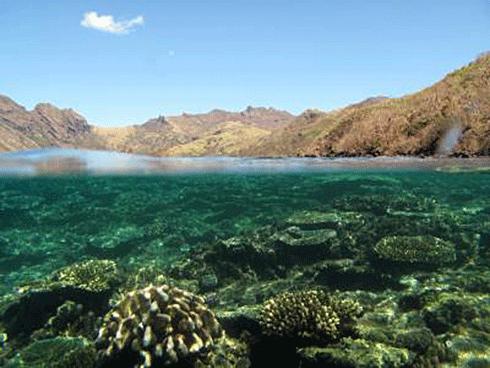Forest protection helps preserve coral reef health
Ecos 2013(190) - https://doi.org/10.1071/EC13297
Published: 23 December 2013

|
When researchers from the WCS and the University of Queensland evaluated the effects of terrestrial protected area designs on Fiji's coral reefs, they found that what's best for land ecosystems is also best for coastal corals.
The authors of the study, which appears in the online edition of Marine Policy, are Carissa Klein of the University of Queensland; Stacy Jupiter of the Wildlife Conservation Society; and Matthew Watts and Hugh Possingham of the University of Queensland.
‘When designing terrestrial protected areas, the key is to consider not only how much they benefit terrestrial biodiversity but also how much they benefit coral reef ecosystems,’ said Dr Klein.
‘Thinking about the connections between the land and sea is rarely done when designing protected areas – Fiji is leading the way globally.’
Most managers realise how downstream ecosystems such as coral reefs can be negatively affected by land-based activities that cause increases in runoff and associated sediments, nutrients and chemicals. Yet there have been few documented cases where protected area networks have been designed using truly integrated planning to minimise such external threats.
This matters in small island states like Fiji, where selection of terrestrial protected areas has been mostly ad hoc, and based more on the cultural or timber value of forests than on any desire to protect biodiversity.
Fiji's current terrestrial protected areas, which cover less than 3 per cent of land area in the country, neither adequately protect Fiji's sensitive island habitats and species, nor contribute much to minimise runoff to adjacent coral reefs.
‘We're pleased that the results of our study confirm that the forests [we were] considering for protection can offer significant downstream benefits to coral reefs,’ said Dr Stacy Jupiter, Fiji Country Program Director and co-author on the study.
‘However, we were surprised to find that these priority places for management actually did not include a lot of the key threatened forest vegetation types. We therefore recommended to ... add some additional forests to their national register of priority places for protection.’
‘Fiji is to be commended for their constructive response to the findings of this important scientific research,’ said Dr Caleb McClennen, Director of the WCS Marine Program.
‘Their decision to take action and link land to sea conservation helps to ensure the long term security of their globally important coral reef ecosystems while supporting the livelihoods and resilience of coastal communities.’
Source: EurekAlert!


